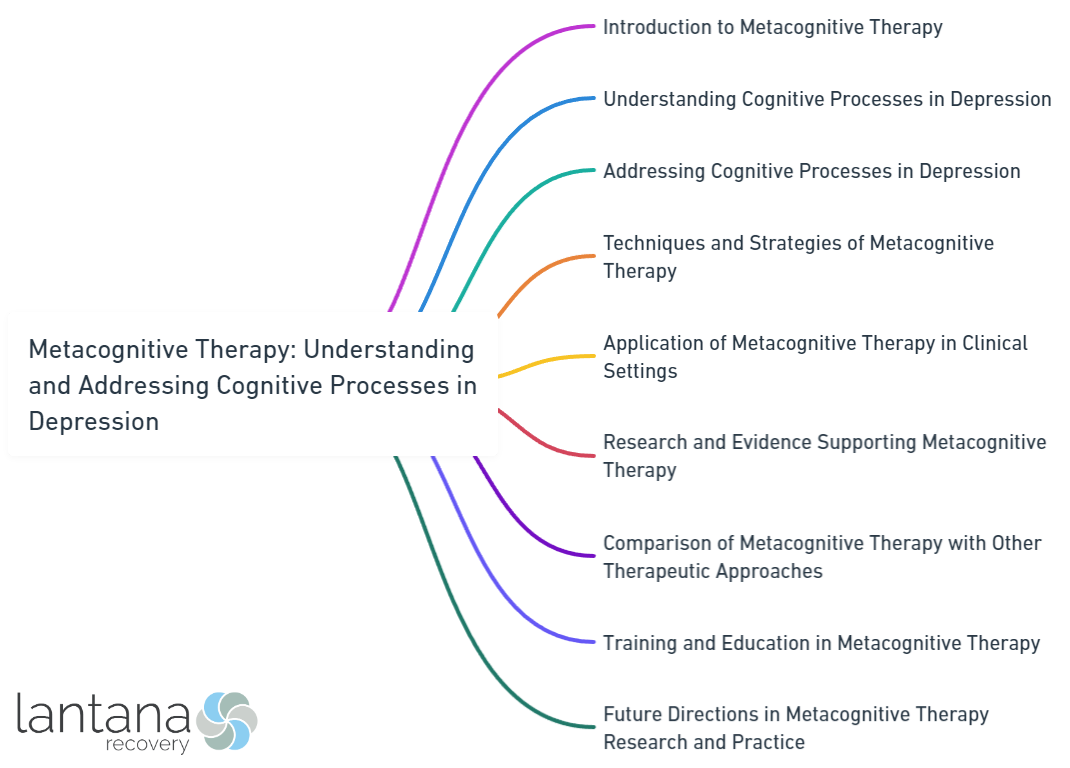Metacognitive Therapy (MCT) is a cutting-edge approach in the field of psychotherapy that aims to address and understand the underlying cognitive processes associated with depression. By focusing on an individual’s thinking patterns and beliefs about their thinking, MCT offers a unique perspective on combating depression. Unlike traditional cognitive therapy, MCT emphasizes metacognition, which involves thinking about thinking and gaining insight into one’s own cognitive processes.
In order to grasp the significance of MCT, it is important to understand the cognitive processes that contribute to depression. Negative thinking patterns play a crucial role in maintaining depressive symptoms, and MCT aims to identify and modify these patterns. Metacognitive beliefs, which refer to an individual’s thoughts and attitudes about their thinking, also contribute to the development and perpetuation of depression.
One common cognitive process associated with depression is rumination, which involves repetitive and negative thinking about past events or concerns about the future. MCT employs strategies to address rumination and reduce its influence on depressive symptoms.
To address these cognitive processes, MCT utilizes specific techniques and interventions. It focuses on challenging and modifying negative thinking patterns, using techniques such as cognitive restructuring and detached mindfulness. MCT also targets metacognitive beliefs through interventions aimed at promoting flexible thinking and reducing excessive self-focus.
Studies like the 2018 study The Efficacy of Metacognitive Therapy by Normann and Morina have shown the effectiveness of MCT in treating depression, with research supporting its efficacy in reducing symptoms and preventing relapse. Compared to other treatments, MCT offers advantages such as targeting the underlying cognitive processes directly, promoting long-term change, and being a relatively brief intervention.
By understanding and addressing cognitive processes through Metacognitive Therapy, individuals suffering from depression can gain insight into their thinking patterns and develop effective coping strategies. MCT provides a valuable approach to mental health treatment by offering a unique perspective on addressing depression.

What is Metacognitive Therapy?
Metacognitive therapy, also known as MCT, is a form of psychotherapy that specifically targets cognitive processes in the context of mental health, particularly in relation to depression. The main goal of MCT is to enable individuals to identify and modify maladaptive thinking patterns, thus promoting the development of more constructive thought patterns.
Within metacognitive therapy, individuals are taught to become conscious of their thoughts, and beliefs, and how these impact their emotions and behaviors. They are encouraged to critically evaluate the accuracy of their thoughts and challenge any negative or unhelpful beliefs they may hold. Through the acquisition of metacognitive skills, individuals can gain greater control over their thoughts and effectively manage their emotions.
An essential focus of metacognitive therapy is the recognition and regulation of worry and rumination, both of which are standard features of depression. Individuals are trained to identify excessive rumination and worry, and they are provided with strategies to diminish these repetitive and unproductive thinking patterns.
Another pivotal aspect of metacognitive therapy involves attention training. Individuals learn to divert their attention away from negative thoughts and instead direct it towards positive and constructive thoughts. By cultivating a positive mindset, individuals can improve their overall well-being and alleviate symptoms of depression.
It is important to note that for metacognitive therapy to be effective, it is crucial to collaborate with a trained therapist who specializes in this therapeutic approach as well as other interventions like occupational therapy as needed. Additionally, integrating mindfulness and self-reflection into daily routines can enhance the development of metacognitive skills and maximize therapeutic outcomes.
What are the Basic Principles of Metacognitive Therapy?
“Metacognitive Therapy (MCT) is a treatment approach for depression based on the Wells and Matthews self-regulatory model, emphasizing metacognitive processes over challenging the content of depressive thoughts” (MCT in Recurrent and Persisten Depression, Wells et al., 2007.) It is guided by several basic principles. One of these principles is the awareness of negative thinking patterns. It is important for individuals to recognize these patterns in order to understand their impact on their emotions. Additionally, metacognitive therapy involves challenging and modifying metacognitive beliefs. This means questioning and replacing unhelpful beliefs that contribute to negative thinking patterns with more adaptive beliefs.
Another principle of metacognitive therapy is restructuring attention and focus. This involves shifting attention away from rumination and negative thoughts and redirecting focus towards positive aspects of life. It is also important for individuals to develop adaptive coping strategies. This can be achieved through learning techniques such as cognitive defusion, thought stopping, and problem-solving skills to manage distressing thoughts and emotions.
Lastly, metacognitive therapy emphasizes gradual behavior change. Individuals are encouraged to take small steps towards behavior change that is consistent with their goals and values. This helps cultivate a sense of control and improve overall well-being.
True Story: John, a middle-aged man struggling with depression, sought help from a metacognitive therapist. Through therapy, John recognized his negative thinking patterns and their impact on his mood. By challenging his beliefs and redirecting his attention, he experienced significant improvement. With the support of his therapist, John also developed coping strategies and engaged in positive behaviors. These efforts resulted in a reduction of depressive symptoms and a regained sense of control and resilience. Metacognitive therapy empowered John to address his cognitive processes and ultimately improve his mental well-being.
How Does Metacognitive Therapy Differ from Traditional Cognitive Therapy?
Metacognitive therapy distinguishes itself from traditional cognitive therapy in several significant ways. Instead of focusing on the specific content of thoughts, it prioritizes the process of thinking. The aim of this therapy is to cultivate individuals’ awareness of their thinking patterns and equip them with effective strategies for managing negative thoughts and emotions. In contrast, traditional cognitive therapy primarily concentrates on identifying and challenging negative thoughts and beliefs.
Another contrasting factor is the role of rumination. Traditional cognitive therapy aims to reduce rumination by questioning and replacing negative thoughts. In contrast, metacognitive therapy directly targets the process of rumination itself. It helps individuals recognize their patterns of rumination and instructs them on strategies to interrupt and disengage from this repetitive thinking.

Understanding Cognitive Processes in Depression
Cognitive processes are important in the development and maintenance of depression. By understanding these processes, we can gain valuable insights into depressive symptoms and develop effective interventions. Here are some key aspects to consider:
1. Negative thinking patterns: Those with depression often have negative thoughts and beliefs about themselves, others, and the world around them. These distorted thinking patterns include pessimism, self-criticism, and hopelessness. Recognizing and challenging these negative thoughts is important in addressing depression.
2. Cognitive biases: People with depression may focus on and remember negative information while disregarding positive or neutral information. This bias towards negativity can perpetuate depressive cycles. By becoming aware of these biases, individuals can learn to challenge and reframe their perceptions.
3. Rumination: Rumination is the repetitive and intrusive focus on negative thoughts and feelings. This intensifies depressive symptoms and hinders effective problem-solving. Learning to identify and interrupt rumination can help break the cycle of negative thinking.
4. Cognitive distortions: Depressed individuals engage in cognitive distortions, which are errors in thinking that reinforce negative beliefs. Common distortions include overgeneralization, personalization, and catastrophizing. Recognizing and replacing these distortions with realistic and balanced thoughts is essential in cognitive therapy.
5. Core beliefs: Core beliefs are deeply ingrained and rigid beliefs about oneself, others, and the world. In depression, these beliefs are often negative and influence perception and behavior. Identifying and challenging these beliefs can lead to significant changes in cognitive processes and overall well-being.
Understanding the cognitive processes involved in depression is crucial for effective treatment and recovery. Applying cognitive techniques, such as cognitive restructuring and mindfulness, can help individuals gain control over their thoughts and develop healthier thinking patterns. With the guidance of a qualified therapist, individuals can cultivate positive cognitive processes and enhance their well-being.
What are the Negative Thinking Patterns in Depression?
The negative thinking patterns in depression significantly impact a person’s thoughts, emotions, and overall well-being. These patterns can contribute to the maintenance of depressive symptoms. Here are some common negative thinking patterns in depression:
1. Black-and-white thinking: This pattern involves seeing things in extreme terms, such as viewing situations as either all good or all bad. It can lead to an inability to see shades of gray and contribute to feelings of hopelessness.
2. Overgeneralization: This pattern involves drawing broad negative conclusions based on limited experiences. For example, experiencing one failure and believing that you are a failure in all areas of life.
3. Personalization: This pattern involves attributing negative events to oneself without considering alternative explanations. It can lead to feelings of guilt and self-blame.
4. Catastrophizing: This pattern involves magnifying the importance or impact of negative events and expecting the worst possible outcome. It can increase anxiety and make problem-solving challenging.
5. Self-discounting: This pattern involves dismissing positive experiences or qualities and focusing only on the negative. It can contribute to low self-esteem and feelings of worthlessness.
These negative thinking patterns can be addressed and modified through therapy, such as metacognitive therapy. By challenging and reframing these patterns, individuals can develop more balanced and realistic thinking styles, which can help alleviate depressive symptoms. It is important to seek professional help from experts at an institution like Lantana Recovery if you or someone you know is struggling with depression and negative thinking patterns.
How Do Metacognitive Beliefs Contribute to Depression?
Metacognitive beliefs play a significant role in contributing to depression. Instead of evaluating the validity of their thoughts, individuals with depression tend to adopt metacognitive beliefs that have a negative impact on their emotions and behaviors.
One way in which metacognitive beliefs contribute to depression is through overgeneralization. People with depression often generalize negative experiences, mistakenly believing that a single negative event means that their entire life is negative. This distortion of reality reinforces negative emotions and thoughts.
Rumination is another manifestation of metacognitive beliefs that worsens depression. These beliefs lead individuals to constantly dwell on past negative events or worry excessively about the future. This repetitive and intrusive rumination prolongs depressive episodes and exacerbates symptoms.
Furthermore, metacognitive beliefs contribute to self-blame and personalization in individuals with depression. They tend to blame themselves for negative events and view themselves as the cause of all problems. This unhealthy self-perception reinforces negative beliefs about self-worth and perpetuates negative thinking.
Catastrophizing is yet another way in which metacognitive beliefs impact depression. Such beliefs lead individuals to engage in catastrophic thinking, where they exaggerate the negative consequences of a situation and believe that the worst outcome is inevitable. This intensifies feelings of hopelessness and despair.
Addressing and challenging these metacognitive beliefs is essential in the treatment of depression. Metacognitive therapy aims to help individuals identify and modify these negative beliefs, replacing them with more realistic and helpful thoughts. By questioning the accuracy and usefulness of these beliefs, individuals can develop a more adaptive mindset, thereby reducing the impact of metacognitive beliefs on their depressive symptoms.
Understanding the contribution of metacognitive beliefs to depression is crucial for developing effective interventions and assisting individuals in alleviating their depressive symptoms. By addressing these maladaptive beliefs, individuals can strive to cultivate a healthier perspective and enhance their overall well-being.
What is Rumination and How Does it Impact Depression?
Rumination is a cognitive process that can have an impact on depression. It involves continuously thinking about the same negative thoughts or feelings without finding a solution. This repetitive thinking can worsen depressive symptoms.
When people ruminate, they dwell on their problems and setbacks without finding a resolution. This constant focus on negative thoughts can intensify feelings of sadness, hopelessness, and helplessness. It can also hinder problem-solving and prevent engagement in positive activities.
Rumination is linked to maintaining depressive symptoms and developing chronic depression. It keeps people stuck in negative thinking, preventing them from moving forward and finding adaptive coping strategies.
Metacognitive therapy addresses rumination by helping individuals recognize and challenge their repetitive negative thoughts. Techniques like mindfulness, attentional refocusing, and cognitive restructuring are used to break the cycle of rumination and promote more adaptive thinking. By reducing rumination, individuals can gain better control over their thoughts and emotions, leading to improved mood and well-being.
Understanding the impact of rumination on depression is crucial for developing effective interventions. There are interventions like NAD treatment for depression that target the specific cognitive process of rumination and promote recovery.
Note: Rumination is more prevalent in individuals with a history of childhood trauma. Childhood trauma increases the risk of developing rumination and depressive symptoms later in life. This highlights the importance of addressing and healing from past traumas in depression treatment.

Addressing Cognitive Processes in Depression
Addressing cognitive processes in depression is crucial for effective treatment and support. Here are important strategies:
- Identify negative thinking patterns: Depression often involves distorted and negative thinking patterns. Therapy can help individuals recognize and challenge these negative thoughts, replacing them with more realistic and positive ones.
- Conduct cognitive restructuring: Examine and reevaluate unhelpful beliefs and attitudes that contribute to depression. By challenging and modifying these cognitive processes, individuals can develop more adaptive and positive ways of thinking.
- Practice mindfulness: Develop awareness of the present moment, allowing individuals to observe thoughts and emotions without judgment. This practice can help break the cycle of negative thinking and cultivate a more compassionate and accepting mindset.
- Use positive affirmations: Incorporate positive affirmations in daily life to counteract negative self-talk and enhance self-esteem. By repeating positive statements, individuals can address cognitive processes in depression and cultivate a more positive outlook.
- Engage in behavioral activation: Encourage engagement in pleasurable and meaningful activities to counteract negative cognitive processes associated with depression. By participating in enjoyable activities, individuals can boost mood and overall well-being.
True Story: Emily, a 28-year-old woman, struggled with severe depression and found her negative thoughts consuming her life. Through therapy, Emily learned to identify and challenge her distorted thinking patterns. By addressing her cognitive processes, Emily developed a more positive and realistic outlook. She practiced mindfulness and used positive affirmations to counteract her negative self-talk. Additionally, through behavioral activation, Emily incorporated activities she enjoyed, such as painting and hiking, into her daily routine. Addressing cognitive processes played a crucial role in Emily’s journey towards recovery from depression.
What Techniques are Used in Metacognitive Therapy to Address Negative Thinking Patterns?
Metacognitive therapy incorporates various techniques to effectively address negative thinking patterns. These techniques play a crucial role in assisting individuals to identify and challenge their negative thoughts, ultimately leading to the development of more adaptive and positive thinking styles:
- Cognitive restructuring: This technique involves the process of identifying and actively questioning negative automatic thoughts, subsequently replacing them with more realistic and balanced thoughts. Through cognitive restructuring, individuals can gain awareness of thinking distortions and cultivate rational and constructive thoughts.
- Decentering: Decentering enables individuals to create distance from their negative thoughts and emotions. The aim of this technique is to teach individuals to observe their thoughts in an objective manner. By developing a sense of detachment, individuals can diminish the impact of negative thinking on their mood and behavior.
- Attention training: It aims to redirect attention away from negative thoughts and towards the positive aspects of life. This technique involves the cultivation of mindfulness and the focus on present-moment experiences, discouraging individuals from dwelling on past or future worries.
- Metacognitive monitoring: It assists individuals in gaining awareness of their thinking processes by observing and monitoring the frequency and content of negative thoughts. By gaining insight into their thinking patterns, individuals can identify triggers and recurring patterns that contribute to negative thinking, thus facilitating the process of modification.
- Behavioral activation: It involves actively engaging in activities that bring pleasure and a sense of accomplishment. By increasing positive activities, individuals can counterbalance the negative impact of their thoughts and enhance their overall mood and well-being.
The implementation of these diverse techniques within metacognitive therapy aims to help individuals break free from negative thinking patterns and foster the development of a more positive and adaptive mindset.
How Does Metacognitive Therapy Challenge and Modify Metacognitive Beliefs?
Metacognitive therapy is an effective approach that challenges and modifies metacognitive beliefs in order to alleviate symptoms of depression. But how exactly does it accomplish this?
The therapy first focuses on identifying and questioning negative thoughts. Helping individuals recognize the negative thoughts that contribute to their depressive symptoms, it empowers them to challenge the accuracy and validity of these thoughts. Through this process, individuals can then modify these negative thoughts and beliefs.
Additionally, metacognitive therapy encourages individuals to examine the function of their thoughts. Instead of solely focusing on the content of these thoughts, the therapy helps individuals understand that it is not the thoughts themselves that are problematic, but rather their relationship with them. By gaining this insight, individuals can develop a more balanced perspective and take control of their thoughts and emotions.
Another key aspect of metacognitive therapy is promoting detached mindfulness. Researchers Normann and Morina explain how in the practice of detached mindfulness, the patient is guided to recognize internal trigger thoughts and then distance themselves from these thoughts by taking a step back and refraining from engaging in any additional coping mechanisms or repetitive processing in response to them.
Furthermore, metacognitive therapy aims to break the cycle of rumination often associated with depression. Techniques such as attention training and worry postponement are utilized to help individuals reduce the frequency and duration of rumination. By intervening in this pattern of repetitive rumination, individuals can break free from their grip and experience relief from depressive symptoms.
By challenging and modifying metacognitive beliefs, metacognitive therapy empowers individuals to change their relationship with their thoughts and emotions. This transformative process leads to improved mental well-being and ultimately reduces depressive symptoms.
True Story: Sarah, a 35-year-old woman, suffered from depression for a number of years. However, through the guidance of metacognitive therapy, Sarah was able to question the validity of her negative thoughts and challenge her beliefs. Over time, she gained a more balanced perspective and took control of her thoughts and emotions. As a result, Sarah successfully reduced her depressive symptoms and vastly improved her overall quality of life.
What Strategies are Employed to Reduce Rumination in Metacognitive Therapy?
Rumination is a common cognitive process in depression. In metacognitive therapy, various strategies are employed to reduce rumination and help individuals break free from this cycle. One strategy utilized in metacognitive therapy is cognitive distancing. This particular approach aids clients in creating psychological distance from their thoughts. By recognizing their thoughts as mere mental events rather than objective truths, clients gain a new perspective and reduce their tendency to ruminate.
Another effective strategy employed is cognitive restructuring. This involves the process of challenging and replacing negative and maladaptive thoughts with more balanced and realistic ones. By identifying cognitive distortions and substituting them with evidence-based and logical thoughts, individuals are able to reduce rumination and improve their overall well-being.
Attention training techniques are another aspect employed in metacognitive therapy to diminish rumination. These techniques increase awareness of one’s attentional focus and teach individuals to redirect their attention away from triggers. Actively training attention lessens the hold that rumination has on thoughts and emotions.
To address underlying issues contributing to rumination, therapists at an outpatient rehab institution like Lantana may also teach problem-solving skills. By developing effective problem-solving strategies, individuals are able to actively confront life problems and lessen the need to ruminate.

Effectiveness and Benefits of Metacognitive Therapy
Metacognitive therapy (MCT) is an incredibly effective approach for addressing cognitive processes in depression, providing numerous benefits. MCT focuses on identifying and modifying unhelpful thoughts and beliefs that contribute to depressive symptoms, making it a powerful treatment option.
An advantage of MCT lies in its emphasis on metacognition, which involves thinking about one’s thinking processes. By targeting metacognitive beliefs and strategies, MCT helps individuals comprehend the influence of their thoughts and beliefs on their emotions and behaviors.
MCT also equips individuals with practical tools to regulate their thoughts and responses. By recognizing and challenging negative or distorted thinking patterns, MCT enables the development of more adaptive and positive thinking styles.
Moreover, MCT places a strong emphasis on cultivating self-awareness and self-reflection. Through guided exercises and techniques, individuals learn to monitor and evaluate their thoughts and beliefs, leading to a more accurate perception of reality.
Incorporating effectiveness and highlighting the benefits of Metacognitive Therapy, this approach proves to be a highly valuable and beneficial intervention for individuals struggling with depression.
What are the Advantages of Metacognitive Therapy Compared to Other Treatments?
When it comes to treating depression, metacognitive therapy offers several advantages compared to other treatments. These advantages include targeting the root cause of depression by addressing negative thinking patterns and cognitive processes.
This disruption of the rumination cycle and the development of resilience helps to prevent future depressive episodes. Additionally, metacognitive therapy is highly flexible and can be tailored to each individual’s specific cognitive patterns and beliefs.
This personalized approach enhances the therapy’s effectiveness and promotes long-term success. Furthermore, metacognitive therapy is an efficient treatment option that can yield significant improvements in as few as 8-12 sessions. This makes it a time-efficient choice for those seeking relief from depression.
Moreover, metacognitive therapy focuses on building metacognitive skills and fostering a more adaptive thinking style, reducing the risk of relapse and empowering individuals to maintain their mental well-being even after therapy.
Considering all these advantages, metacognitive therapy offers a highly effective treatment option for depression. If you are looking for a therapy that targets the root cause, offers flexibility, provides efficient results, and lowers the risk of relapse, metacognitive therapy may be the ideal choice for you.
Frequently Asked Questions
What is the purpose of the study comparing metacognitive therapy (MCT) and cognitive behavior therapy (CBT) in treating major depressive disorder?
The purpose of the study was to compare the effectiveness of MCT and CBT in treating major depressive disorder in adults. The study aimed to assess the clinical efficacy and potential benefits of MCT over CBT.
What was the trial design used in the study?
The study employed a parallel randomized single-blind trial design. 174 adults with major depressive disorder were randomly allocated to either the MCT or CBT treatment arm.
What were the primary outcome measures used in the study?
The co-primary outcome measures were symptom severity on the Hamilton Depression Rating Scale (HDRS) and the Beck Depression Inventory II (BDI-II) at post-treatment. These measures were used to evaluate the effectiveness of MCT and CBT in reducing depressive symptoms.
Were there any significant differences found between MCT and CBT in symptom severity?
There were no significant differences in symptom severity on the HDRS at post-treatment or follow-up between the two groups. However, there was a significant difference favoring MCT on the BDI-II at post-treatment, which was maintained at six-month follow-up.
Did MCT or CBT show better outcomes in terms of meeting recovery criteria?
More patients in the MCT group met formal criteria for recovery on the BDI-II compared to the CBT group at both post-treatment and follow-up. This suggests that MCT may have a greater impact on improving depressive symptoms and achieving recovery.
What were some limitations of the study?
The study had several limitations, including the use of only two therapists, possible allegiance effects, and differences in time under therapy between the MCT and CBT groups. These limitations should be taken into consideration when interpreting the results.
What implications does the study have for the treatment of depression?
The results suggest that MCT may have considerable beneficial effects in treating depression that may exceed those of CBT. Since depression is a major cause of global disability and current treatments have limited success rates, MCT offers a promising alternative approach. However, further research is needed to fully assess the relative efficacy of MCT compared to CBT in depression.









